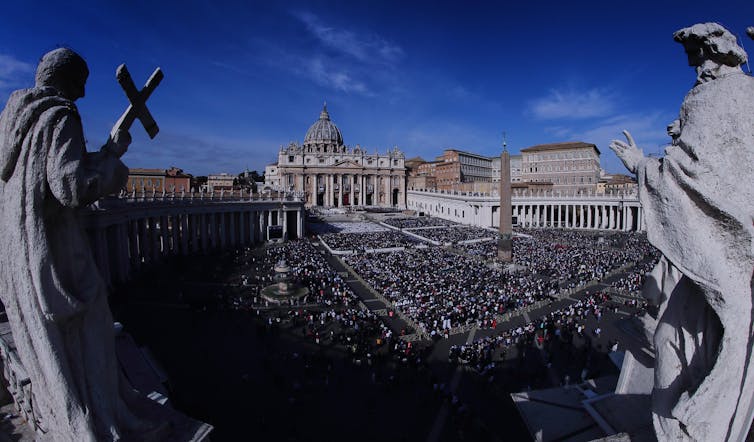One of the comforting stories the British told themselves in the 19th and 20th centuries was that they were implacably opposed to slavery.
Britons had decided “that the disgrace of slavery should not be suffered to remain part of our national system”, or so Lord Stanley, the colonial secretary at the moment of abolition, maintained. It was a claim willingly accepted by later generations. The 1833 Act that abolished slavery in Britain’s Atlantic empire reflected the undivided national will.
But recent scholarship casts doubt on that verdict. The West Indian planters, who held hundreds of thousands in bondage, were well-connected and influential. The freeing of their captive workers did not seem to them inevitable. Many abolitionists thought the same, despairing at the entrenched power of the slave masters.
When slavery went, it went because a series of political crises in Britain splintered the pro-slavery Tory coalition that had dominated politics for decades. It ended too because resistance by the enslaved in the Caribbean convinced legislators in London that slavery was no longer sustainable. But not all commentators were persuaded that slavery had to go.
Newman and the Oxford Movement
One of them was John Henry Newman (1801-1890), fellow of Oriel College Oxford and the vicar of St Mary’s, Oxford’s university church.
Newman was one of the most significant churchmen of the age. Eventually received into the Roman Catholic church in 1845, he became the most influential English Catholic of the 19th century. He was made a cardinal in 1879, and in 2019 he was canonised. For that reason, Newman’s name is attached to dozens of Roman Catholic schools and colleges in Britain, as well as a university in the West Midlands.
But before his conversion, he was a leading figure in the Oxford Movement, a high church group that wanted to renew the institutional authority of Anglicanism by emphasising its rootedness in the early church. Appealing to scripture, the path favoured by Evangelical Anglicans, was dismissed as insufficient.
There were political consequences. Evangelicals of the time tended towards anti-slavery. The clergymen who made up the Oxford Movement did not. Indeed, notes prepared by John Henry Newman for a sermon at Oxford in 1835 reveal that he was profoundly hostile to the idea of emancipation.
Preaching against emancipation
Abolitionist rhetoric about human brotherhood was brushed aside. “It is a very easy thing,” Newman told his congregation, “to talk of loving all men”. But could his congregation, were they to be whisked from their cloistered lives in Oxford to the West Indies, do so in practice? Newman thought not:
It is said to be one of the most difficult tasks of our Ministers to persuade white men to receive the Holy Communion with blacks. I do not say such reluctance is a light sin – it is a serious one – yet perhaps we should feel strongly tempted to it if we lived in the countries where they are to be found. I do not doubt we should.
An aversion to communing with black people was, Newman suggested, quite understandable. It would require white people to hurdle an insurmountable racial barrier.
Having established, in his own mind at least, that racial repulsion was instinctual, Newman turned to the matter of slavery. As was usual with clerical defenders of slavery, Newman reached for the epistles of St Paul. Taking Paul’s first letter to the Corinthians as his text, the vicar of St Mary’s came to this conclusion:
Now we find in these words a doctrine stated, very startlingly and unpalatable to men of this day, but which is most clear and certain and contained in other parts of Scripture – viz that slavery is a condition of life ordained by God…
Contemporary abolitionists who drew upon the gospel when criticising slavery did so without warrant. They were guilty of uttering “idle and false words”. Warming to his theme, Newman went on to rail against reformers more generally. Their talk of “liberty, equality, rights, privileges, and the like” was offensive to God.

Zuma Press, Inc./Alamy
Assessing Newman
Historical figures, it is often said, need to be assessed by the standards of their own time. Yet John Henry Newman’s venomous sermon, coming little more than a year after the end of slavery in the British sugar islands, reminds us that the “standards of the time” were plural.
Many Britons of the 1830s gloried in abolition, but there were many others who were content with slavery and racial subjugation. And there were some, like Newman, who were willing to say so in provocative ways.
Newman’s words from 1835 have been forgotten, but John Henry Newman has not. Students and educators at those institutions that bear his name might want to consider whether it should continue to be so attached.

Felecia Phillips Ollie DD (h.c.) is the inspiring leader and founder of The Equality Network LLC (TEN). With a background in coaching, travel, and a career in news, Felecia brings a unique perspective to promoting diversity and inclusion. Holding a Bachelor’s Degree in English/Communications, she is passionate about creating a more inclusive future. From graduating from Mississippi Valley State University to leading initiatives like the Washington State Department of Ecology’s Equal Employment Opportunity Program, Felecia is dedicated to making a positive impact. Join her journey on our blog as she shares insights and leads the charge for equity through The Equality Network.




